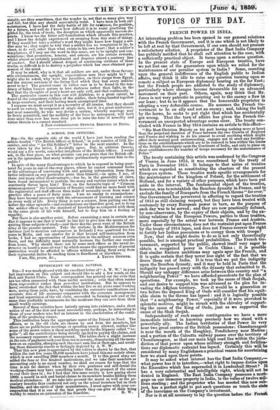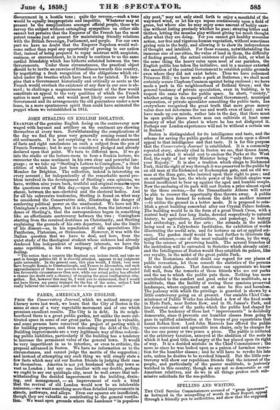TOPICS OF THE DAY.
FRENCH POWER IN INDIA.
AN interesting problem has been opened in our general relations with the French Government, and it is one which is not likely to be left at rest by that Government, if our own should not procure a satisfactory solution. A proprietor of the East India Company has publicly notified that he shall call attention to the ease, with a sufficiently practical object. It turns upon a serious question. In the present state of Europe and European treaties, have we not lost one of the guarantees upon which we relied for the maintenance of our peculiar system in India ? Some, counting upon the general indifference of the English public to Indian affairs, may think it idle to raise any question turning upon so remote a subject as European diplomacy bearing on the far East; but the French people are addicted to the study of diplomacy, particularly where Changes become favourable for an advanced movement on their part. Others again may think that Mr.
Jones is not very patriotic in pointing '
g out to the enemy a flaw in our lease; but to us it appears that the honourable proprietor is adopting a very defensible course. He assumes the French Go- vernment to be an ally and not an enemy ; and, taking the bull by the horns' he seeks to put right that which has accidentally. got wrong. That the turn of affairs has given the French Go- vernment an unexpected advantage seems clear. The treaty con- cluded with France in May 1814 contains an article to this effect— "His Most Christian Majesty on his part having nothing more at heart than the perpetual duration of Peace between the two Crowns of England and France and wishing to do his utmost to avoid anything which might affect their mutual good understanding, engages not to erect any fortifica- tions on the establishments which are to be restored to him within the limits of the British Sovereignty upon the Continent of India, and only to place on these establishments the number of troops necessary for the maintenance of Police."
The treaty containing this article was confirmed by the Congress of Vienna in Tune 1815, it was reconfirmed bjr.the treaty of Paris in November 1815. It belongs to that series of treaties which are regarded as constituting the charters of the present European system. These treaties made specific arrangements for the maintenance of the kingdom of Poland, for the settlement of Holland, and for a variety of other purposes, which have been put aside in the interval. The fundamental object of the treaties, however, was to reestablish the Bourbon dynasty in France, and to exclude the family of Bonaparte from the French throne "for ever." Our Government has persevered in affecting to regard the treaties of 1816 as still claiming respect, but they have been treated with contumely by every European power in turn, as the purpose of each day was to be served; and they are now practically defunct, by non-observance, by the expiry of their objects, and by the ex- isting relations of the European Powers parties to those treaties, more especially by the actual war between France and Austria. Under these circumstances, does not the restraint put upon France by the treaty of 1814 lapse, and does not France recover the right to fortify her Indian posessions or to occupy them with troops? Now, that she might desire to do so is not only theoretically possible, but is amongst practical probabilities. The French Go- vernment, supported by the public showed itself very eager to
i
obtain a recognized power n public, China; • it Is possible
that similar Eastern ambitions may again spur the French, and it is quite certain that they never lose sight of the fact that we drove them out of India. It is true that we put the indignity upon the Bourbon dynasty, and it may be held in Paris that the indignity has passed away with the dynasty that submitted to it. Should any unhappy difference arise between this country and "a neighbouring Power we have afforded precedents for the plan of operations. For example, we took up the cause of Shah Soojoh, and our desire to support him was advanced as the plea for in- vading the Afghan territory. Now it would be a generation or two before the deposed King of Oude will consider that his equit- able claim to the throne has lapsed : and it is logically possible that "a neighbouring Power," especially if it were provoked to splenetic motives might be struck with the chivalry of support- ing the cause of the King of Oude, just as we supported the cause of the Shah Soojah. Independently of such remote contingencies we have a more immediate interest in knowing precisely how we stand with a powerfully ally. The Indian territories of that Power lie very near two great centres of the British possessions: Chimdurnagoor is near the mouth of the Hooghley, Pondicherry near Madras ; and a portion of the Calcutta railway passes over the territory of Chandurnagoor, so that our main high road lies within the juris- diction of that power upon whose military strength and fortifica- tions our diplomatic restraint has lapsed. Certainly this will be considered by many Englishmen a practical reason for ascertaining how we stand upon these points.
It may be asked what interest has the East India Company, what power has it to interfere,—what right to impose duties upon the Executive which has superseded it in Leaden-hall Street? It has a very substantial and intelligible right, which will not be denied in England. The East India Company possesses a mort- gage on our immense property in India, to the value of twelve mil- lions sterling; and the proprietor who has mooted this new sub- ject, has a perfect right to put such questions as touch the state of the insurance on the Company's investment.
Nor is it at all necessary to lay the question before the Frew*
Orovernment in a hostile tone ; quite the reverse,—such a tone would be equally inappropriate and impolitic. Whatever may at present be the complications amongst official people, those who survey the subject without entangling sympathies on either side cannot but peroeive that the Emperor of the French has the most potent reasons just at present for maintaining friendly relations with the British Sovereign, Parliament, and people. For our own part we have no doubt that the Emperor Napoleon would wel- come rather than repel any opportunity of proving to our nation that, instead of being prepared to repay mistrust with suspicion, coolness, or encroachment, he is ready to continue to us the same cordial friendship which has hitherto subsisted between the two Governments. Under these circumstances, the practical object should be to invite an exercise of friendliness towards this country, ty negotiating a fresh recognition of the obligations which ex- isted under the treaties which have been so far tainted. To ima- gine that a Government historically and critically so acute as the French would overlook the existence of any flaw in our case is ab- surd; to challenge a magnanimous treatment of the flaw would constitute an appeal to the very qualities of which the French nation is most proud, and would most likely secure our Indian Government and its arrangements the old guarantees under a new -lease, in a more spontaneous spirit than could have animated the puppet whom we reestablished in 1815.



























 Previous page
Previous page